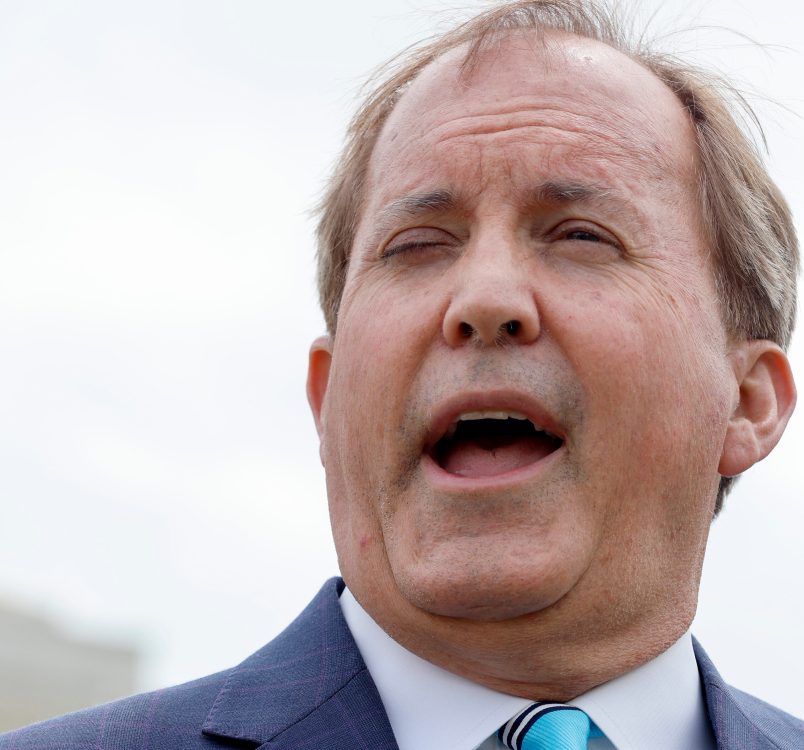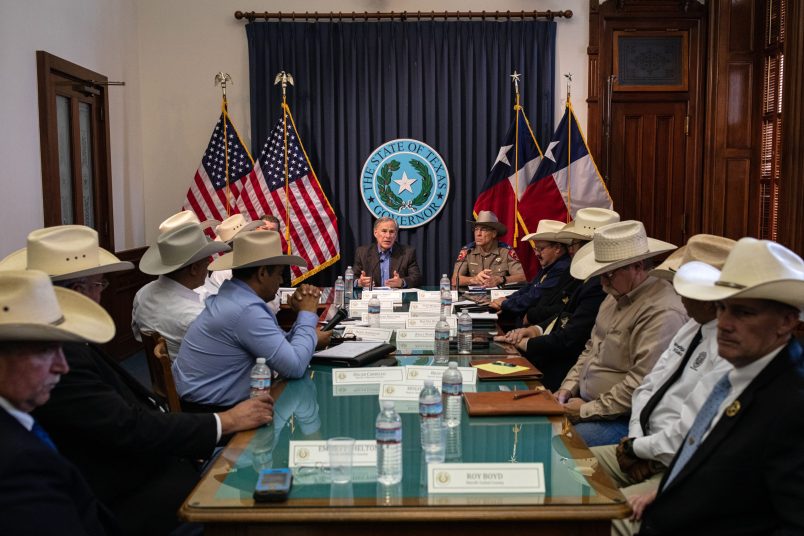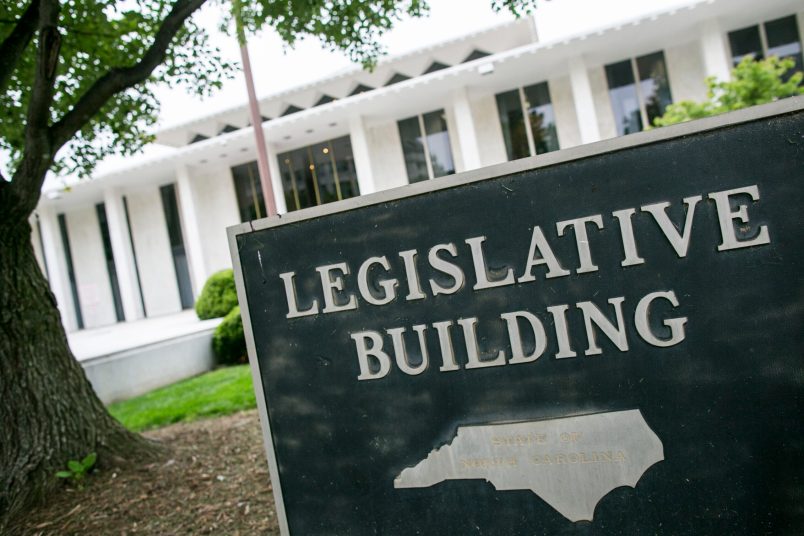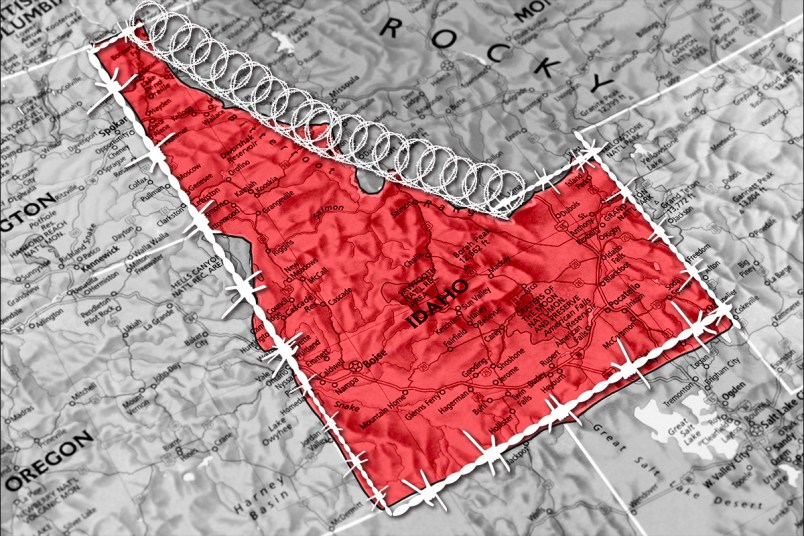Kansas Secretary of State Kris Kobach (R) filed his first criminal charges last week since being given the authority to prosecute voting crimes earlier this year.
Kobach’s office filed three cases on Oct. 9 that he said were alleged instances of double-voting. After Gov. Sam Brownback (R) signed legislation in June giving Kobach the authority to prosecute such cases, the secretary of state said his office had already identified 100 instances of potential double voting in the Sunflower State; he signaled in a Tuesday interview with The Wichita Eagle that he’d file more cases in the coming months.
The arch-conservative Kobach has long warned about the danger voter fraud poses to the integrity of elections in Kansas even though voter fraud is incredibly rare. The secretary of state even admitted in an interview last month with local TV station KWCH that instances of double-voting were “a small percentage of the number of votes cast. Less than 1% of the votes in any given election.” But he justified prosecuting those cases on the grounds that even a small number of double-voters could have an impact on an election.
“The question is do we have close elections in Kansas that sometimes come down to one or two or five votes,” Kobach said, as quoted by KWCH. “And the answer is, yes, we have them all the time.”
Here’s what you need to know about first voting crimes allegations being prosecuted by the only secretary of state in the nation to have that power.
The complaints lack detail about the alleged crimes
You wouldn’t know the three defendants had allegedly double-voted from reading the complaints filed against them.
Lincoln L. Wilson of Sherman County was accused of voting in Kansas in 2010, 2012 and 2014 without being lawfully registered, which is a misdemeanor, and perjuring himself on election forms, which is a felony. Wilson did not respond to a request for comment from TPM.
Kobach told The Wichita Eagle that he believes Wilson’s primary residence is in Colorado and accused him of serial double-voting. The complaint against Wilson does list representatives from two Yuma County, Colorado agencies as witnesses to the voting crimes but makes no other reference to Wilson allegedly having voted in Colorado.
The remaining two complaints accused Steven and Betty Gaedtke of voting in 2010 in Johnson County without being lawfully registered, a misdemeanor. An attorney for the couple listed in court records did not return a request for comment from TPM.
Kobach told the Associated Press that the married couple also allegedly voted in Arkansas. The complaints against the Gaedtkes list Lt. George Caldarara, who oversees criminal investigations in Marion County, Arkansas, as a witness.
One of the defendants reportedly admitted to double voting
Wilson told The Wichita Eagle last week that he did vote in both Yuma County, Colorado and Sherman County, Kansas. He said he has several real estate properties in each state and believed he could vote in both, as long as he only voted in one county per state.
“When I look at a Colorado form, I’m signing a Colorado form. It doesn’t say it’s a United States form, it says it’s a Colorado form,” Wilson told the newspaper. “In Kansas, my reasoning was the same.”
“I know for a fact that I only voted for one president,” he added, as quoted by The Wichita Eagle. “The issues in Kansas that I vote for would’ve been for that general election, such as property tax … and if I voted for a senator or a representative in the state of Kansas, that would have nothing to do with a senator or a representative in the state of Colorado.”
All three defendants were registered Republicans
Kobach’s critics argue that laws he’s pushed to eliminate voter fraud, in particular one that requires Kansans to prove their U.S. citizenship in order to register to vote, end up targeting people who tend to vote for Democrats.
All three of the defendants in the cases Kobach’s office currently is prosecuting are registered Republicans.
Voter registration records showed that Wilson currently is a registered Republican in Sherman County. Steven and Betty Gaedtke currently are registered to vote as Republicans in Marion County, Arkansas, records also showed.
The Wichita Eagle reported that voting records show the couple were registered as Republicans in Johnson County in 2010, however.
A local prosecutor apparently declined to bring two of the cases
Kobach’s office referred the two Johnson County cases to local prosecutors who then declined to bring charges, according to testimony the secretary of state gave in January while pushing the legislation that ultimately gave him prosecutorial authority over election fraud cases.
Those cases involved people who voted in advance by mail in Johnson County and also in person at the polls in Arkansas, where the Gaedtkes are currently located, according to Kobach’s testimony.
Johnson County District Attorney Steven Howe, who argued in January that giving Kobach prosecutorial authority would be “unnecessary and redundant,” reportedly referenced the Gaedtkes’ cases during his testimony.
State Rep. John Carmichael (D) told The Wichita Eagle that he remembered Howe was asked about two cases where voters in 2010 cast ballots in both Johnson County and Arkansas. Howe answered that the couple were former residents of the county who voted in Kansas by advance ballot by mistake, according to Carmichael.
Through a spokeswoman, Howe declined to comment to TPM on the cases Kobach’s office filed in Johnson County.
A case in Sherman County in which an individual also allegedly voted in Colorado—presumably Wilson’s—was referred to the FBI, which took no action, according to Kobach’s testimony.
Arkansas’ secretary of state gave Kobach a thumbs-up
The secretary of state in Arkansas, where the Gaedtkes allegedly double-voted in 2010, said last week that he respected Kobach’s efforts to prosecute voter fraud.
Secretary of State Mark Martin told The Wichita Eagle that his office “opposes any attempts at voter fraud or other actions that might compromise the integrity of the electoral system as well as voters’ confidence in that system.”
Martin’s office does not have the power to prosecute election fraud.






